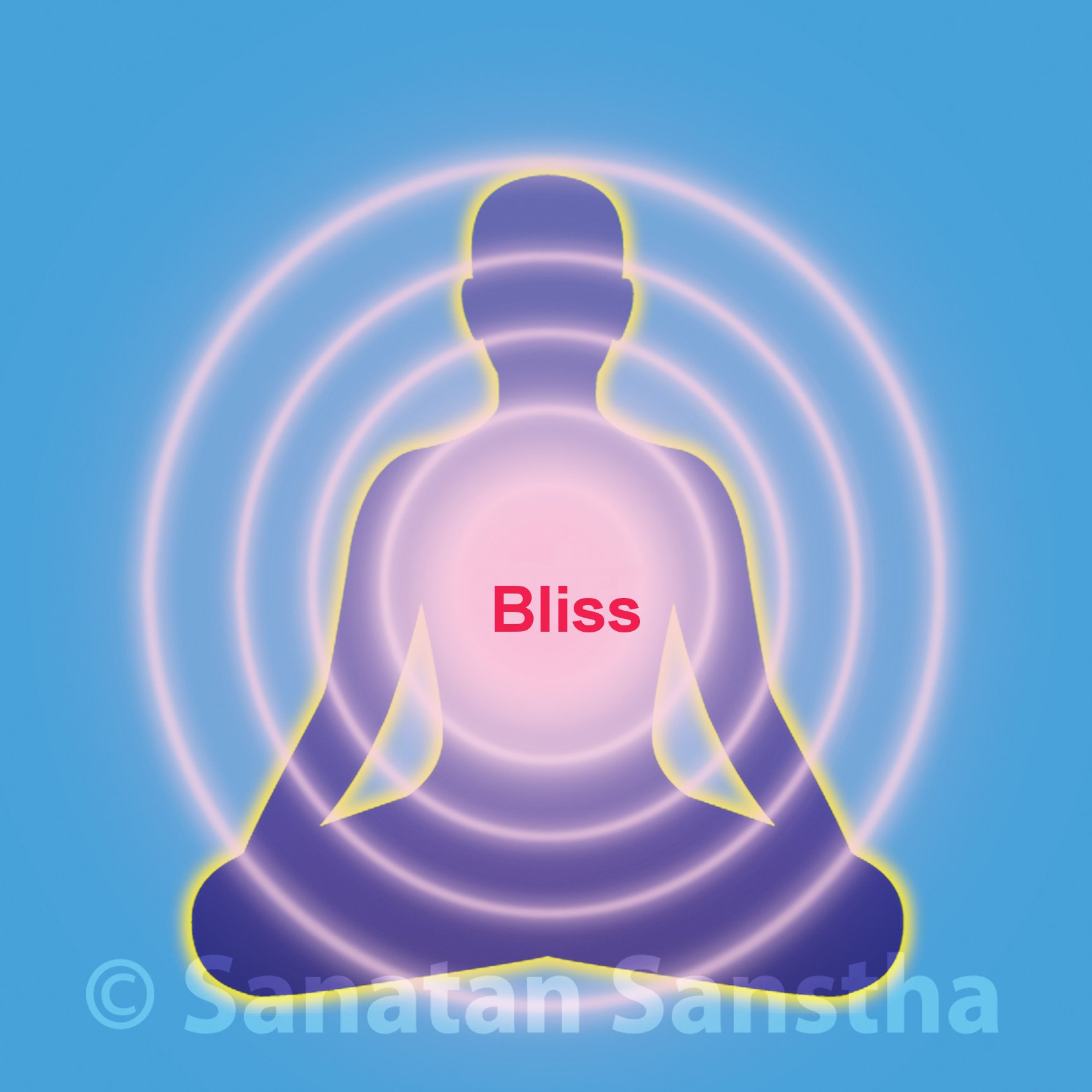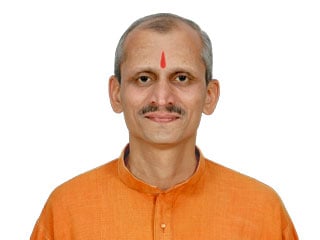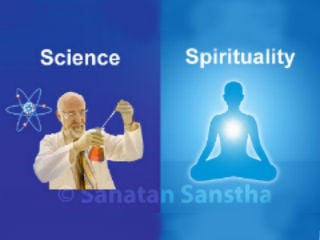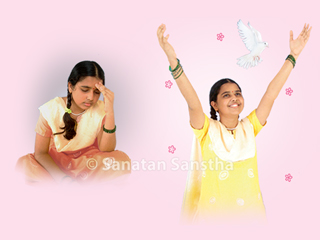Happiness, which is everlasting and has supreme quality, is called Anand. Since most people do not know how to attain Anand, each one tries to acquire atleast temporary happiness through the five senses, mind and intellect. However, Anand is present within us only. When we perform sadhana (Spiritual practice), we experience Anand. When the waves of Anand are generated in the body, Anand is experienced throughout the body. After experiencing the Anand within, we experience Anand in every creation of God. Anand is the basic nature of the individual and the universe. Hence, the inclination of an individual is to move towards its basic nature, that is, to obtain Anand and after reaching its basic nature retain that state of Anand.
1. Definitions of Anand
-
Anand is the favourable experience beyond the five senses, mind and intellect experienced by the Jivatma (Embodied soul undertaking spiritual practice) in the Shivadasha (The state of being one with Shiv [God Principle]) or by Shivatma (God-realised soul).
-
यस्मिन्स्थितोनदुःखेनगुरुणाप्यविचाल्यते । – Shrimadbhagwadgita, Adhyaya 6, Shloka 22
Meaning : When the mind does not get disturbed even by intense sorrows and remains in Anand, this itself is the state of Atmanand (Anand obtained due to self-realisation).
-
सुखमात्यन्तिकंयत्तत्बुद्धिग्राह्यमतीन्द्रियम् ।
यं लब्ध्वाचापरं लाभंमन्यतेनाधिकंततः ।। – Shrimadbhagwadgita, Adhyaya 6, Shloka 21, 22Meaning : After acquiring that happiness, where one does not desire to obtain any other kind of happiness is known as Atmanand.
-
When satisfaction is experienced in the chitta (Subconscious mind), the trait which arises in the chitta easily is termed as Anand. When sattvikta is filled in the chitta, the chitta does not deviate from the state of sattvikta due to manifestation of Raja-Tama components. Anand is constantly reflected in this state of chitta. However, the person has to remember here that true Anand lies beyond sattvikta.
2. Difference between happiness and Anand
Happiness is a pleasant sensation experienced by the individual through the five senses, mind and/or intellect; whereas, Anand is a favourable spiritual experience of the Jivatma or the Shivatma when the functions of the five senses, mind and intellect have ceased.
Each of us has experienced happiness at sometimes or the other. Since the experience is obtained through the medium of the five senses, mind and intellect, we can comprehend its definition. Contrary to this, since most of us have not experienced Anand and since many are not even aware that there may be something to experience beyond the five senses, mind and intellect, most people find it difficult to understand the definition of Anand. Just as one blind since birth will find it difficult to accept the fact that the world is visible or a child will not be able to understand the meaning of sexuality, no matter how hard one tries to explain it, so also it is difficult to explain the meaning of Anand. It cannot be expressed in words but has to be experienced.
However, for the purpose of explaining the meaning of happiness and Anand, let us use a gold bracelet as an example. The pleasant sensation that one gets from an object without form, that is, the gold used for making a bracelet, in this case is termed as Anand; while that obtained from an object with form, that is, the bracelet, is called happiness. In reality, we get only happiness from gold, but since we could not find a better example to explain this concept, we have used this example.
Comparison of Happiness and Anand
| Happiness | Anand | |
|---|---|---|
| 1. Fraction of unhappiness | Present | Absent: fraction of happiness is also absent |
| 2. Duration | Short | A. Depends on Nirbij samadhi B. As per kal (Time) C. Sahajavastha D. Even in the next birth for a long time (Moksha) |
| 3. Quality | inferior | Supreme |
| 4. Propertion | Limited | Unlimited (if there is happiness even in ignorance. imagine how great Anand in spiritual knowledge will be!) |
| 5. Boredom | Not just boredom, but the one experiencing happiness may also develop detachment for it or may feel dejected | There is no boredom, because Anand is the nature of soul; example – sugar never tires of its sweetness |
| 6. Contentment | Temporary | Depends on the duration |
Anand is not the neutral point between happiness and unhappiness, but lies beyond them. Anand begins where expectation of happiness ends.
3. How to obtain Anand?
That which is infinite and eternal is the true source of Anand. It bestows eternal Anand and liberates us from the bondage of unhappiness permanently. We try to obtain Anand from transient objects. Since transient objects are ever changing and have limitations, they cannot impart everlasting happiness. Without understanding the eternal Principle within us if we try to gain happiness or peace from transient objects it will prove to be futile. Our Anand is within us. Hence, we should not have expectations that someone else will impart happiness to us. If we understand the value of that which is eternal, then we will be able to obtain Anand even from transient objects.
Following methods will help us understand the value of that which is eternal.
-
Abiding by Dharma (Righteousness)
सुखार्थाःसर्वभूतानांमताःसर्वाःप्रवृत्तयः ।
सुखंचनविनाधर्मात्तस्माद्धर्मपरोभवेत् ।। – Vagbhatkrut Ashṭanghrudaya, Sutrasthan, Adhyaya 2, Shloka 19Meaning : The tendency of all living beings is to attain happiness (in this context the word happiness is used synonymously with Anand), but they cannot expect to get it without following the ethics of Dharma. Hence, the ethics should be followed. A person, who abides by Dharma, whether he is knowledgeable or ignorant, will certainly experience happiness.
-
Sadhana
Only when the impressions of desires and instincts, likes and dislikes, personality defects etc. are wiped from the subconscious mind, that is, only when Avidya (Ignorance) is destroyed, only then we can experience Anand lying dormant within ourselves. This method of destroying impressions and Avidya is called ‘sadhana’. Namasmaran (Chanting), satsang (Company of the God Principle), satseva (Service unto the Absolute Truth, that is, God Principle), tyag (Sacrifice unto the Absolute Truth) and Priti (Spiritual love devoid of expectations) are the main aspects of vyashṭi sadhana (Individual spiritual practice that benefits only the seeker undertaking it). Sadhana wipes the impressions on the subconscious mind. Apart from this, the sanchit karma (Accumulated account) decreases and the ability to withstand suffering due to destiny increases. Besides, by performing sadhana we can avoid mistakes taking place due to kriyaman-karma (Wilful actions), since decisions taken are more appropriate due to an increase in sattvikta.
-
Company of Saints
-
‘The Anand that an ordinary man experiences in the company of a woman is constantly experienced by one who is Jivanmukta (One who is liberated from the cycle of birth and death); hence, he does not have sexual desire.’ – Saint eknath Maharaj
-
‘The lesser the desire in a person, the more is the Anand experienced in his company. Despite the desires being present in a subtle form in children, we like them. Then, ‘Being in the company of one whose desires have been completely destroyed (due to God’s grace) is blissful – why should you be surprised by this?’ Saints emit waves of Anand. Every seeker experiences them once he is able to perceive the subtle dimension, which is beyond the comprehension of the five senses, mind and intellect.
-
In the company of an evildoer, a person begins to consider unhappiness, for instance stealing, drinking alcohol etc. as happiness. In the company of a Saint however, happiness appears to be like unhappiness. This is true vairagya (Detachment). Saints destroy the very desire for happiness. Similarly, in the company of a Saint, as we acquire the strength to endure unhappiness, even unhappiness appears like happiness. Hence, we do not feel unhappy in the presence of Saints, only Anand is experienced. Saint Tukaram Maharaj says ‘Surrender unto Saints and hold their feet tight before the unhappiness reaches the mind’.
-
Just as cancer cells are destroyed with certain radiations, so also dissolution of the mind and intellect occurs due to the waves emitted by a Saint when a person remains in a Saints company for a long time. In other words, the sukshma-deha (Subtle body), karan- deha (Causal body) and avidya are destroyed and the person experiences inner Anand.
-
-
Sacrifice of happiness
The more we sacrifice the material happiness, lesser is the unhappiness experienced and more is the experience of Anand. Hence, it is said – प्रापणात्सर्वभोगानाम्परित्यागोविशिष्यते ।, meaning sacrificing material happiness has been given special importance since one experiences temporary happiness in materialism; whereas, in sacrifice, initially one experiences unhappiness, but later only Anand is experienced in it.
-
Avoiding loss of energy
That pure energy which is utilized in wishing for happiness is itself blissful in nature. Once this is realized, desires will not be generated at all.
-
Loving others
Our culture teaches us that a person’s happiness and unhappiness depend on his karma. All can never get the same amount of happiness. Although happiness and unhappiness are dependent on action, love is independent of it. Hence, we can express sympathy towards one who is suffering. This augments the individual psychological strength and we are able to tolerate the sufferings. This itself is the special feature of our Dharma. Due to such a loving tendency, man’s attitude becomes sattvik and he learns to make greater sacrifices. Thus, his requirements go on reducing and gradually he is able to reach a state of self-realisation.
-
Destroying ego
Anand means forgetting the self. ‘Dharma states that when oneness with Brahman is achieved, we experience eternal happiness. If this is true, then from a person’s perspective, attaining Moksha (that is, blending of the Atma [Soul] with Paramatma [God Principle]) itself is the supreme goal. We should certainly leave this body, but should also destroy the awareness of ‘I’-ness. Dharma states that, even thereafter we will experience happiness. If the one experiencing happiness himself does not exist, then happiness will be of consequence to him, so strange is this concept (reality). (When ‘I’-ness ends only Brahman exists and since its nature is Sat-Chit-Anand, we get the spiritual experience of Anand. At that time, there is non-duality between the one experiencing it and the experience itself.)
-
If Brahmans follow Dharma, then samashti (for the society) happiness and Anand is experienced
The world’s happiness depends on the Brahmans (One who belongs to the first of the four classes, studies scriptures and imparts knowledge to the society) being righteous, and unhappiness lies in their being unrighteous. Adi Shankaracharya in the commentary on Bhagwadgita has said, ब्राह्मणस्यहिरक्षणेनरक्षितोवेदधर्मः ।, which means that, only if Brahmans observe Brahman-Dharma meticulously, only then Veda-Dharma will be protected. When no one behaves unrighteously there is a lot of love among all varnas (Classes) and castes, and consequently, the world becomes happy. Thus, happiness and unhappiness of the world depends on Brahmans alone.
Reference: Sanstha’s Holy Text on ‘Introduction to Spirituality‘ and ‘Spirituality‘


 Unite the Jiva (embodied soul) with Shiva by performing Sadhana (Spiritual practice)
Unite the Jiva (embodied soul) with Shiva by performing Sadhana (Spiritual practice) Identify unpleasant incidents of the day that are obstacles in sadhana !
Identify unpleasant incidents of the day that are obstacles in sadhana ! Physical sciences and the science of Spirituality
Physical sciences and the science of Spirituality Importance of Spirituality
Importance of Spirituality Why are we born?
Why are we born? Types of happiness and heaven or Moksha?
Types of happiness and heaven or Moksha?